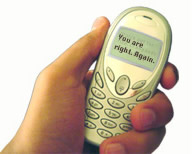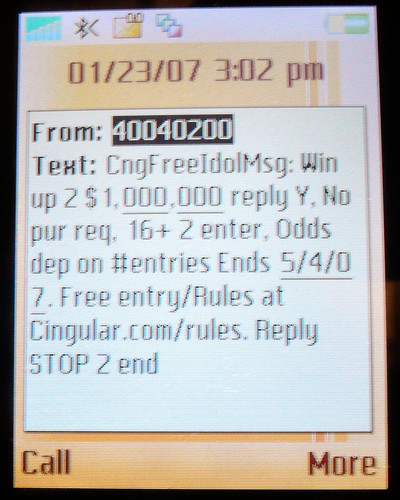Oct 30th, 2007
Mobile etiquette: This post sent from my phone
Email sent from a desk does not equal email sent from a mobile device.
When you send an SMS text or chat message people understand the casual, quick nature of the medium, and therefore expect a level of casualness when it comes to spelling full words (u versus you, ppl versus people) and forming complete thoughts and sentences. Just as spoken language is conversational, chat and SMS afford a certain level of laxness.
Email has evolved. There was a time when typing in all lowercase (hopefully you never typed in all caps) was normal enough for email. But since it has become the mainstay of corporate communication, it has dressed up accordingly. Although emoticons occasionally find their way into corporate emails, cute misspellings and abbreviations don’t.
New etiquette is needfully emerging. How do recipients know you’re sending an email from a device versus your desktop? When I’m writing a note via email from a mobile device, to a work colleague, must I type in complete thoughts and sentences? Must I capitalize and punctuate?
When I first saw Apple’s “Sent from my iPhone” default signature I thought it just let me show off my cool quotient with an iPhone reference. What they really did was create a disclaimer: forgive the typos and the informality.
(I thought about actually posting this from my phone, but blogging requires a certain level of formality that I wasn’t prepared to take on with a mobile device. That would be more appropriate for my microblog.)
Web favorites
- Casino Europei On Line
- Casino Sites Not On Gamstop
- Gambling Sites Not On Gamstop
- Betting Sites UK
- Casino Not On Gamstop
- Casinos Not On Gamstop
- Best Online Casino Canada
- Non Gamstop Casino Sites UK
- Sites Not On Gamstop
- Non Gamstop Casinos UK
- Non Gamstop Casinos
- Slots Not On Gamstop
- Best Non Gamstop Casinos
- UK Casino Not On Gamstop
- Gambling Sites Not On Gamstop
- Slots Not On Gamstop
- Non Gamstop Casinos UK
- Meilleur Casino En Ligne France
- Beste Online Casino Nederland
- Best Non Gamstop Casinos
- Non Gamstop Casino
- Betting Sites UK
- Casino Non Aams Italia
- Casino Online Non Aams
- UK Casino Not On Gamstop
- Casino Online
- Casino En Ligne Belgique
- Meilleur Site De Casino En Ligne Belgique
- Siti Scommesse Non Aams
- 파워볼사이트
- オンラインカジノ ライブ
- плинко
- Cresus Casino Interdit En France
- Casino En Ligne Fiable
- Siti Di Scommesse Non Aams
- 仮想通貨カジノ おすすめ
- Casino En Ligne France
- Casino En Ligne Français
- Casino Non Aams
- Bonus Casino En Ligne




